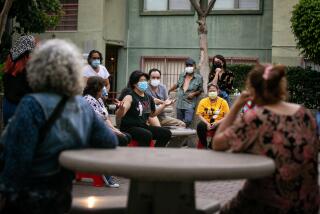The Legal Uses of a Tenant’s Security Deposit Are Limited
- Share via
Question: My tenant gave me seven days’ notice that she will be moving out of her apartment at the end of the month. She has not cleared her phone bill, so I would like to hold onto her security deposit until she pays it. If she does not pay the bill, then I will take the money from the deposit to pay it. Is that legal?
Answer: Using the tenant’s deposit money to pay a phone bill is illegal. State law allows deductions from tenants’ security deposits for only three purposes. They are unpaid rent, damages and cleaning.
If your tenant is on a month-to-month rental agreement, you are entitled to a 30-day notice of her intent to vacate. Therefore, you may be able to keep some of the deposit money for unpaid rent if you can’t immediately re-rent the apartment after she leaves.
Assuming the notice corresponds with the end of the month and rental period, you can keep up to 23 days’ worth of rent from the deposit money unless you re-rent the unit before that time. You cannot keep any deposit money for rent after re-renting the unit because California law prohibits you from collecting double rents.
State law also requires you to refund security deposits within 21 days. If the apartment is not rented at that time, you are probably safe in keeping the entire 23 days rent. If, however, you rent the apartment on the 22nd day, you are obliged to return two days’ worth of rent to the tenant.
Hard to Break Lease Over Floor Repairs
Q: A year and a half ago we signed a one-year lease upon moving into a Beverly Hills townhouse. It included a hand-written amendment that said we could renew the lease at its end, which we did. It also included a note saying that the hardwood floors, which were in poor condition, would be refinished.
There are many weak spots in the floor and two of the top boards have even come off completely, revealing termite damage below. After several written and oral requests to the landlord, he finally sent over a repair man. He only replaced two support boards and does not even intend to replace the top boards for another few weeks.
As we do not believe that it is safe for us to live here anymore, we have decided to move. Our landlord, however, is holding us to our lease. He has $4,000 of our deposit money and expects us to pay rent until a new tenant is found. We believe that as the original agreement of getting refinished hardwood floors was never honored, we are able to break the lease legally. What do you think?
A: It appears as if the original lease note gave you ample notice that there were some floor problems. Then you renewed the lease after the first year after no floor repairs had been made. Your claim that the hardwood floor now represents such an unsafe condition that the apartment is not habitable is probably a hard sell, particularly since repairs now have begun.
According to Trevor Grimm, general counsel to the Apartment Assn. of Greater Los Angeles, “It would take a material breach of the contract to absolve the tenant of his contractual obligation.”
From what you’ve written in your letter about the severity of the problem, it seems to be less than a material breach. It may be a habitability defect, though. But that is not grounds for breaking the lease.
If an apartment has a habitability defect, under the state’s repair-and-deduct law, you are allowed to spend up to one month’s rent twice a year to have it fixed. Just make sure you have given the landlord ample notice, preferably in writing, that you intend to use this remedy.
You ask if you have the right to break the lease because the floors were not “refinished” (the definition of which is subject to debate) to your satisfaction.
Only a judge knows for sure, but you take a risk of substantial rent liability, the rent for the balance of the lease, if you break the lease and the landlord has trouble re-renting the townhouse
Postema is the editor of Apartment Age magazine, a publication of AAGLA, an apartment owners’ service group, and manager of public affairs for the California Apartment Law Information Foundation. Mail your questions on any aspect of apartment living to AAGLA, 12012 Wilshire Blvd., Los Angeles, CA 90025.
More to Read
Inside the business of entertainment
The Wide Shot brings you news, analysis and insights on everything from streaming wars to production — and what it all means for the future.
You may occasionally receive promotional content from the Los Angeles Times.










